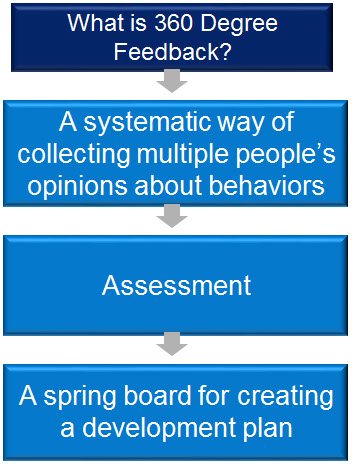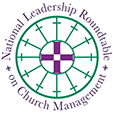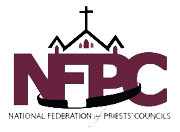
The Catholic Leadership 360 program has been developed by the National Leadership Roundtable on Church Management, National Federation of Priests’ Councils and the National Association of Church Personnel Administrators. We believe that leadership development and the ongoing formation of priests and lay ministers are vital elements of pastoral ministry in our Church today. We also believe that those who minister in the name of the Church are called to grow in the likeness of Jesus so that their ministry can more accurately reflect his life and communicate his message. Both priests and lay ministers grow to understand and appreciate the meaning and purpose of their ministry as they exercise it. The experience is richer when ministers are asked to reflect upon their words, actions and effectiveness and when they have the opportunity to receive feedback from those with whom they interact and work.
What is 360 Feedback?
360 Degree Feedback is a process in which individual receives feedback from the people who work and minister with him or her.
The feedback is provided through an online survey that is confidential and anonymous.
Those providing feedback include the individual's superior/ supervisor, peers, and direct reports. The person receiving feedback also answer the same survey questions.
Survey responses are compiled into a confidential report by the Catholic Leadership 360 team and delivered only to the participant.
Each participant uses their feedback to create a personal development plan to ensure they grow as leaders as a result of participating in Catholic Leadership 360.

-
Catholic Leadership 360 for Priests
Catholic Leadership 360 for Priests is composed of 3 parts:
-Leadership competencies
-Ministerial Competencies
-Open-ended Questions
-
Leadership Competencies
There are 14 leadership competencies assessing
99 behaviors covering how you lead others, the organization, and yourself.
These competencies include:
-Communication,
-Managing Conflict,
-Listening,
-Bringing Out Best in People,
-Managing Diversity,
-Plan/Set Goals, and
-Time Management.
-
Ministerial Competencies
Ministerial Competencies focus on ministerial identity and role through being a person of faith and minister of the Church.
These competencies look at whether the priest
-appears at ease in his role as a person with a public identity;
-appears at ease representing the Catholic Church;
-manifests a clear service orientation in his life and ministry;
-manifests a healthy, mature awareness of God in his life;
-appears genuinely interested in the people of his parish/diocese; and
-responds to a variety of needs among his parishioners
-
Open-Ended Questions
The two open-ended questions focus on effective ministry.
1) What does it look like when this person is most effective in their role of priestly ministry?
2) What are some areas this person can develop to be more effective in their priestly ministry?
-
Sample Report (Priest)
-
Catholic Leadership 360 for Lay Leaders
Catholic Leadership 360 for Lay Leaders is composed of 3 parts:
-Leadership competencies
-Ministerial Competencies
-Open-ended Questions
-
Leadership Competencies
There are 15 leadership competencies assessing
81 behaviors covering how you lead others, the organization, and yourself.
These competencies include:
-Communication,
-Managing Conflict,
-Listening,
-Bringing Out Best in People,
-Managing Diversity,
-Plan/Set Goals, and
-Time Management.
-
Ministerial Competencies
Ministerial Competencies focus on ministerial identity and role through being a person of faith and minister of the Church.
These competencies look at whether the lay leader
-shares faith by consistently infusing ministry with times of prayer, theological reflection, teaching about the faith, faith sharing, etc;
-participates in the prayer and ritual life of the faith community according to his/her role;
-carries out his/her ministry with evident attention to being part of the diocese and the global Church;
-carries out their ministry in such a way that displays its rootedness in the ministry of Jesus and his injunction to "love one another as I have loved you"
-practices ministry with the kind of commitment expected of a minister of the Church
-
Open-Ended Questions
The two open-ended questions focus on effective ministry.
1) What does it look like when this person is most effective in their role of ministry?
2) What are some areas this person can develop to be more effective in their ministry?
-
Sample Report (Lay Leader)
Would you like more information? Would you like to participate in Catholic Leadership 360?
CONTACT US










